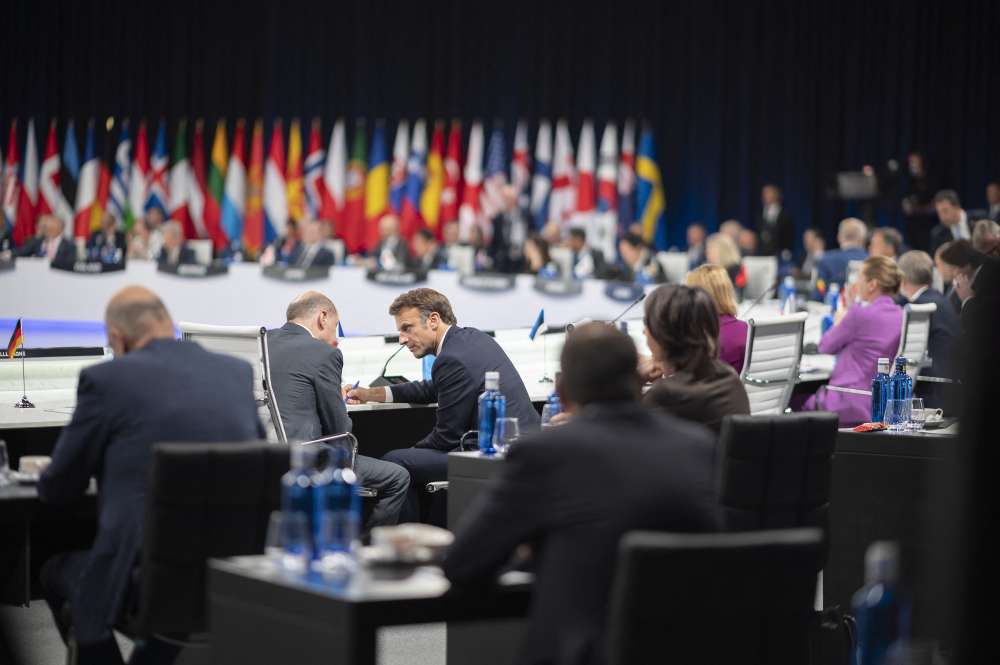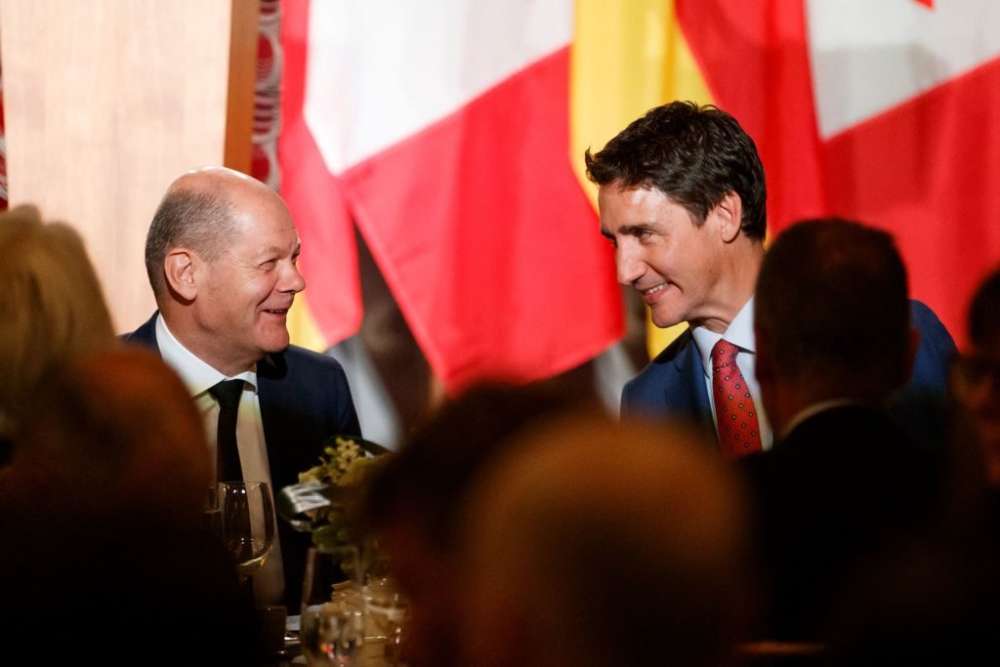Rethinking European Defense Cooperation and Coalitions of the Willing

(Blondet Eliot/ABACA/Shutterstock)
As Germany drafts its new security strategy, it should take the opportunity to embrace more flexible formats of European defense cooperation – including coalitions of the willing.
Germany has always been among the most vocal advocates of inclusive European integration, and has often played an active role in brokering compromises between EU countries to achieve a solution on which all 27 — or formerly 28 — member states could agree. When looking at the coalition agreement, which explicitly labels the creation of a European federal state as the long-term objective of Germany’s policy on Europe, the German position to aim for policies bringing all 27 members on board seems – at least at first glance – coherent. According to this reasoning, full-scale integration across policy areas and states becomes more complicated when some members already cooperate in areas where others may not want to work more closely at all, and thus may potentially never catch up.
Because of these constraints, Germany has continually pushed back against calls for a so-called “multi-speed Europe” or “differentiated integration” which France has often pitched in the hopes of making European security and defense cooperation more agile and reactive. While EU-27 cooperation may indeed be the best solution, a general opposition to closer cooperation of willing and able countries is not automatically beneficial to European integration in the field of security and defense: if these approaches are blocked, it could lead to major frustration in the respective capitals, making EU structures only a framework for minimum consensus. Most recently, this was evident when EU member states decided to implement the Permanent Structured Cooperation (PESCO), a mechanism to allow member states to increase their cooperation on planning, development and investment of joint capabilities on security and defense. While France intensively lobbied for more cooperation among willing and capable states and a higher level of ambition within the PESCO, Germany brokered an agreement to include all member states in PESCO, which fell far below the French level of ambition. Similarly, Germany has shied away from military participation in the most recent ad-hoc European defense coalition, the Takuba Task Force. This unit is composed of Special Forces from European countries and integrated into the French mission Barkhane in Mali.
Key Points:
- Joining ad-hoc coalitions of willing EU member states would help Germany to become a more effective player in European defense policy.
- The EU’s Strategic Compass is the perfect starting point for Germany to change its posture concerning coalitions of the willing and reconsider its “EU-27 only” approach.
- To live up to its aspirations as a leader in Europe, Germany will need to think outside of EU structures.
Particularly when it comes to military involvement, Germany could lean on constitutional constraints to join coalitions of the willing to justify its military reluctance. And the German constitution may allow for more flexibility than often assumed in Berlin. The upcoming national security strategy is an opportunity Germany should seize to revisit its positions and reasonings, and explore possibilities to join ad-hoc coalitions — especially if Berlin wants to live up to its aspiration of being a “servant leader” in the EU.
Coalitions of the Willing Are Add-Ons, Not Replacements
In principle, an “all of Europe” or EU-27 approach to military and defense cooperation makes sense, particularly with regard to legitimizing EU missions. However, these missions are often based on the lowest common denominator, which comes at the cost of ambition and the EU’s ability to (re)act quickly, and restrain member states that may want to go further, for example with more robust mandates for the fight against terrorism. This is why the EU’s Strategic Compass – its first-ever white paper on security and defense policy, which was adopted in March – calls on EU member states to agree on defining guidelines for the use of Article 44 TEU by the end of 2022. This article allows the EU to delegate a task following Common Security and Defense Policy (CSDP) to a group of member states that are willing and able to execute this task — in other words, a coalition of the willing within the structures of the EU. Until now, EU member states have shied away from using this article: but, if implemented correctly, it is a powerful tool to make European security and defense both more agile and more robust.
The Strategic Compass is the perfect starting point for Germany to change its posture concerning coalitions of the willing. Besides its political reluctance, Germany has, over the years, underlined the potential constitutional constraints to explain its abstention from these coalitions. In general, participating in ad-hoc military coalitions outside of the EU is a legal balancing act for Germany, as its constitution requires the deployments of armed forces to be part of a “system of collective security” (Article 24 GG). Under this article, deploying forces to coalitions of the willing outside of the EU or the UN would require, at minimum, a sound legal assessment.
» Germany often plays a major role in humanitarian aid and crisis management. But as it continues to preach the importance of an “integrated approach” that combines civilian and military tools, Germany itself should consider taking the latter out of its toolbox. «
To avoid this obstacle while simultaneously supporting a more ambitious coalition, Germany could focus on creating a coalition of the willing within the EU. In the Strategic Compass, EU member states committed to deciding on the practical modalities of the implementation of Article 44 by 2023. As this timeline was unanimously agreed by member states, it constitutes a perfect opportunity for Germany to abandon its “EU-27 only” approach while living up to its aspiration. In her recent speech on the German security strategy, German Defense Minister Christine Lambrecht announced Germany’s objective to become a leader in European defense. The use of Article 44 and active involvement in the group of countries executing CSDP tasks could, in fact, allow Germany to become a more credible player in European defense, particularly when it comes to robust missions.
While its European partners understand that Germany has a high constitutional requirement for deployments of its armed forces abroad, there is little doubt that Berlin’s lack of military participation does, to some extent, limit its leverage vis-à-vis other states in Europe – particularly when it comes to political decisions potentially involving the use of force. Without a doubt, Germany often plays a major role in humanitarian aid and crisis management. But as it continues to preach the importance of an “integrated approach” that combines civilian and military tools, Germany itself should consider taking the latter out of its toolbox.
European Defense Beyond the EU
To live up to its aspiration as a leader in European defense, Germany should not limit its military and defense cooperation to the EU framework, but also think outside of EU structures. This is particularly relevant since delegating a CSDP task to a group of willing and able member states requires unanimity within the European Council, meaning that individual states still have the ultimate power to veto European action. Further, military cooperation with the UK will, realistically speaking, be impossible through EU structures – and yet, the UK remains a key partner for Europe. Creating coalitions of the willing would present a pragmatic solution.
» Support for coalitions of the willing is less about the nature of the coalition than it is about political will. «
In fact, the German Constitution might give more flexibility in this regard than sometimes assumed. In a 2015 judgement, the German Constitutional Court concluded that deployments of the armed forces are also possible in the framework of coalitions of the willing for collective defense, provided that these coalitions serve the purpose of emergency aid for a NATO or EU partner or a third state.
In other words, support for coalitions of the willing is less about the nature of the coalition than it is about political will – including the will to engage in the public and parliamentary debates on deploying armed forces abroad. If Germany takes its aspirations for a security Zeitenwende – i.e. turning point – seriously, politicians should not shy away from these types of discussions. Particularly in scenarios where quick action is required and an EU decision might take too long, working alongside France and the UK, as well as other Europeans, in the format of coalitions of the willing would be a consistent step for Germany to live up to its claims as a reliable partner and leader in European defense.
Gesine Weber
Research Analyst, German Marshall Fund
Keep on reading

Canada and Germany: Partners in Defending a Shared Approach to International Security
With militarized nationalism and anti-internationalist sentiments on the rise again, Canada and Germany should work together to forge a more effective and inclusive multilateral system – one built on democratic solidarity.

Strategische Geduld bewahren und strategische Vorausschau institutionalisieren
Europa steht vor der dringenden Aufgabe, seine Sicherheit eigenständig zu organisieren. Ganz oben auf Deutschlands To-Do-Liste: endlich die Strukturen innerhalb des Auswärtigen Amts und BMVg überdenken.

Die Wissenschaft muss sich ihrer Bedeutung für die nationale Sicherheit bewusst sein
Deutsche Außenwissenschaftspolitik schafft das nötige Vertrauen zwischen Wissenschaftler:innen, um Lösungen für die Herausforderungen der Zukunft zu erarbeiten. Sie ist die harte Währung im Aufbau einer neuen internationalen Ordnung.